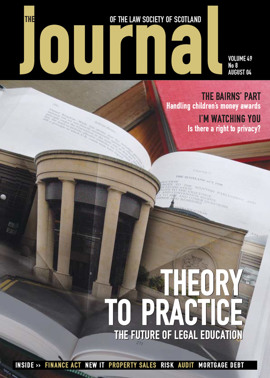Book reviews
Glossary of Legal Terms
I was pleased to learn that eavesdrop, which I thought meant no more than snoop, is another word for stillicide, which, some may recall, relates to one of the few pieces of substantive law to which R L Stevenson laid claim, in that he knew that it was not the same as homicide. Such are the incidental pleasures of this book, which traces its origins to Dewar Gibb’s work of 1949 via A G M Duncan’s two editions of the 80s and 90s.It was good, too, to see “ex turpi causa non oritur actio”, reminding me as it always does of the one-time (grand?)father of the Glasgow Bar, Bob Turpie and his famous litigation about a car, conducted by himself, eventually in the First Division.
The book has its practical uses too and provides a handy source of reference for anyone who wants to learn, or be assisted in remembering, the meaning of a particular term of art.
One thing strikingly demonstrated here is that it is hard to be more succinct than the Latin. For example, Mr O’Rourke’s entirely accurate and sufficient explanation takes four lines to tease out the meaning of “dominus litis”. Calls for Plain English, as for Commonsense Solutions, should be approached with caution (but not the sort that, as Mr O’Rourke helpfully observes, rhymes with nation).
A few suggestions for inclusion? I have always liked the palinode, a document reading “False tongue. I lied”, which if lodged in court could get you out of a defamation action fairly intact. There is a useful word “threip”, which means a quarrel which should have been settled long ago. The maxim “Post hoc ergo propter hoc” – the fact that something happened after something does not mean that it was caused by it – is a generally useful one for lawyers, some of whom (reparation people mostly) do not seem to have heard of it. So too, unhappily, is “casus belli” – “Why did we go to war?”
Andrew Lothian
Social Work and the Law in Scotland
Social Work and the Law in Scotland is an interesting and insightful compilation of essays on social work themes. It is divided into three parts, dealing with conceptual and policy issues, specific areas of practice set in their own legal context, and service user perspectives. Although it has useful author and subject indices, and provides a starting point for further research, it is not a legal textbook.Given the range of topics addressed, there are variations in the approach taken. So, for instance, while Jeremy Roche’s piece, which considers legal and social work values, offers a theoretical insight, Mike Dailly’s contribution on homelessness is much more practical in approach. Such differences are perhaps inevitable in a work of this kind but do not detract from the value of the collection in providing an accessible source of information on current social work issues.
Most topical issues are covered including mental health, disability, child care, abuse, human rights and homelessness. Emerging issues are also identified and Marion McLarty and Moira Hawthorn (“Special Educational Needs: Working with Children and Families”) provide a lucid and helpful commentary on the prospective changes in the law on special educational needs, as contained in the Education (Additional Support for Learning) (Scotland) Act 2004, as well as informed comment on the attendant anxieties of those in need of such support.
Other developmental areas of policy and practice, such as the Joint Futures Agenda, are, perhaps surprisingly, not dealt with in greater detail either in Part I or Part II. The need for an effective, and legitimate framework for the exchange of sensitive personal information across organisational and practice boundaries is also a pressing issue worthy of fuller exploration in future editions.
Given the authority and standing of the contributors in their own areas of expertise, Social Work and the Law in Scotland is, however, a valuable resource which will be of interest to students, advisers and practitioners in this increasingly complex area.
David Sillars, Head of Legal Services, Renfrewshire Council
In this issue
- Making the system work
- Sole survivors?
- Firm foundations
- The paper trail
- Private lives in public
- IT: what next?
- Roll again
- Destiny's child
- The great day comes
- SOX education
- Peer review: staying on target
- Obituary: James D Wheelans, CBE
- Obituary: JAMES D WHEELANS, CBE (1)
- Time, gentlemen?
- Plain English has landed
- Tangle o' the Isles
- Hunting down the pirates
- Scottish Solicitors' Discipline Tribunal
- Website reviews
- Book reviews
- How much law, anyway?
- FSA's net widens






